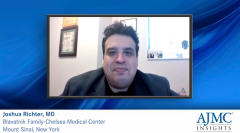
IMiDs and Triplet Regimens in MM and RRMM Therapy
Dr Jonathan L. Kaufman discusses the role immunomodulatory drugs (IMiDs) play within triplet regimens for patients with RRMM.
Episodes in this series

Jonathan L. Kaufman, MD: The 3 IMiDs, or immunomodulatory drugs, we have approved—thalidomide, lenalidomide, and pomalidomide—are core parts of treatment for both newly diagnosed patients, as well as relapsed and refractory patients. Most, if not all, regimens in the newly diagnosed setting, whether it’s part of a 3- or 4-drug therapy, will contain the most commonly prescribed IMiD in the United States, which is lenalidomide. In addition, lenalidomide is approved and routinely used as maintenance therapy, both after transplant and after nontransplant-based therapies. In the relapsed setting, there is also significant use of IMiDs, and whether we use lenalidomide or pomalidomide is dependent on whether the patient is refractory to lenalidomide. I consider those patients who are progressing on maintenance lenalidomide to be refractory to lenalidomide. In the second-line setting, we’ll often use the next-generation IMiD or a more potent IMiD, pomalidomide, in combination in those patients who are lenalidomide refractory. In the relapsed setting, in contrast to the upfront setting, it’s more common to have triplet therapies that don’t include an IMiD, like a monoclonal antibody plus a proteasome inhibitor with dexamethasone. That is a common second-line therapy that doesn’t include an IMiD, but if an IMiD wasn’t used in the second line, it would certainly be used in the third-line setting.
Thalidomide was the first IMiD that was used in the United States. Thalidomide has a significant amount of nonhematologic toxicity—fatigue, constipation, neuropathy—such that it makes it a very difficult drug to give patients, especially in combination with other drugs that can cause neuropathy, as well as a hard drug to give for a long period of time. Outside of the United States, because of cost restraints, it is much more common to use thalidomide-based regimens than lenalidomide-based regimens. Lenalidomide, while it has its own toxicities, is much better tolerated than thalidomide, particularly in terms of neuropathy and fatigue.
This transcript has been edited for clarity.
Newsletter
Stay ahead of policy, cost, and value—subscribe to AJMC for expert insights at the intersection of clinical care and health economics.











